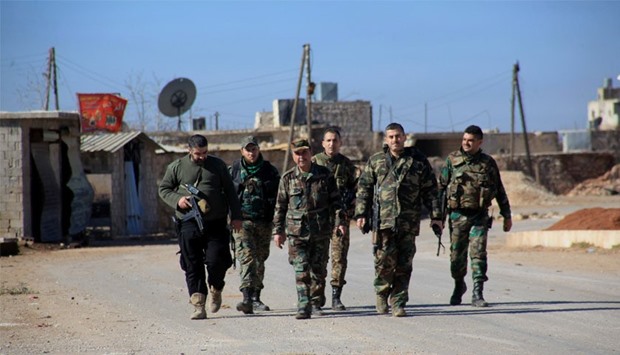In a major blow to the rebels, a military source said that President Bashar al-Assad's army cut the last supply route linking opposition forces in the northern city of Aleppo to the Turkish border.
The source said the army had broken a three-year rebel siege of two government-held Shia villages, Nubol and Zahraa, and taken control of parts of the supply route.
The advance was helped by intense bombing by Russian aircraft in recent days throughout the area north of Aleppo city, according to the Syrian Observatory for Human Rights monitoring group.
The offensive is one of several the government has launched since Moscow threw its military might behind Assad on September 30.
The new advance added to doubts surrounding the already highly uncertain prospects for the launch of peace talks in Geneva.
UN special envoy Staffan de Mistura has been trying for several days to coax government and opposition representatives into indirect negotiations, so far to no avail.
Already on Tuesday, opposition figures in Geneva had expressed outrage at the Russian bombardment and had cancelled a planned meeting with de Mistura.
Defiant Lavrov
Russian Foreign Minister Sergei Lavrov said Wednesday he saw no reason for the air strikes to stop, while slamming "capricious" elements in the HNC and the smuggling of arms into Syria from Turkey.
"Russian air strikes will not cease until we truly defeat the terrorist organisations ISIL and Jabhat al-Nusra," Russian agencies quoted Lavrov as saying in Oman.
He was referring to the so-called Islamic State, the extremist group which has overrun swathes of Syria and Iraq and has claimed bombings and shootings worldwide, and to Al-Qaeda's Syrian branch.
The opposition says the Russian strikes have almost entirely targeted other rebel groups, many backed by the West, Gulf states and Turkey, which shot down a Russian jet on its Syrian border in November.
"Russia is using the political process as a cover to impose its military solution on the ground," Salem al-Meslet from the HNC said.
The hoped-for talks aimed at ending a civil war that has killed more than 260,000 people are part of a roadmap agreed by outside powers in November.
This plan foresees a nationwide ceasefire, an inclusive and non-sectarian government within six months, a new constitution, and free and fair elections within 18 months.
Since the conflict began in March 2011 as an uprising against Assad's iron-fisted rule, more than half of Syria's population have fled their homes -- many heading to Europe.
The tangled conflict has dragged in a range of international players, from Iran, Turkey and the Gulf states to Western nations and Russia. There has been a brutal crackdown on dissent and the economy is in ruins.
De Mistura said on Swiss television late Tuesday that if the UN-brokered talks fail, "all hope would be lost."
He also told the BBC that "the level of confidence between the two parties is close to zero".
The HNC wants Assad to allow humanitarian access to besieged towns, to stop bombing civilians and to release thousands of prisoners -- some of them children -- languishing in regime jails.
Damascus complains that the HNC has failed to present even a list of its negotiators and strongly objects to the inclusion within the Saudi-backed body of rebels that it and Moscow view as "terrorists".
One such figure is Mohammed Alloush, a leading member of Islamist rebel group the Army of Islam and nominally the HNC's chief negotiator, who said in Geneva Wednesday he was "not optimistic".
"The problem is not with de Mistura. The problem is with the criminal regime that decimates children and with Russia which always tries to stand alongside criminals," he said, clutching a photo of a young boy he said was severely wounded by Russian air strikes.
Hijab to the rescue?
The HNC was on Wednesday locked in internal talks in a Geneva hotel -- barred to reporters since Tuesday -- to discuss its next steps, after a tense meeting the previous evening, an opposition source said.
The arrival however on Wednesday of Riad Hijab, the HNC's general coordinator, raised some hopes for progress.
"With Hijab here, the HNC can better demonstrate a unified position in representing the opposition," a Western diplomat said on condition of anonymity.
An AFP reporter said de Mistura arrived on Wednesday afternoon at the hotel, with a second opposition source saying he was there to meet Hijab informally.

